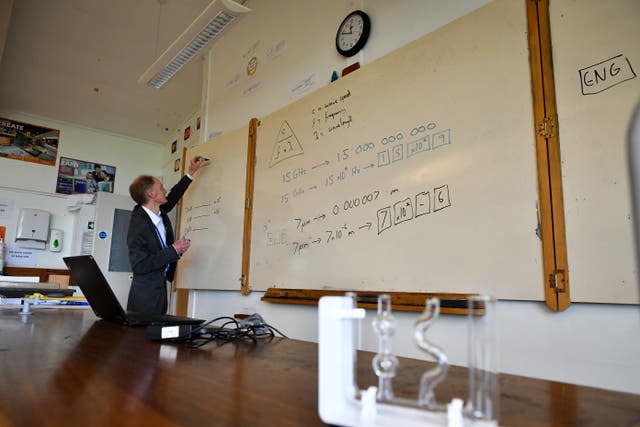[ad_1]
Schools in education and learning “cold spots” discovered in the levelling up White Paper have fewer vacancies and are significantly less most likely to recruit expert science lecturers, according to new analysis.
The White Paper recognized 55 instruction “cold spots”, or schooling investment locations (EIAs), exactly where faculty results are weakest which have been earmarked for qualified aid, such as boosted funding to keep the ideal instructors in significant-precedence topics.
The areas consist of Knowsley, Hartlepool, the Isle of Wight and Oldham.
Researchers explained that Govt programs to recruit more science academics to the EIAs by a income top quality would only get the job done if universities were in search of out professional science instructors in the very first spot.
The investigation located that the quantity of educating vacancies tended to be reduced in the schooling “cold spots”, a craze that pre-dated the pandemic.
Science training vacancies in EIAs were being also much significantly less most likely to specify a distinct science, these as biology or chemistry.
The researchers said that this lent some support to the strategy that retention bonuses for early-occupation academics in subjects this kind of as chemistry and physics could aid universities to preserve instructors in substantial-priority subjects.
They extra that it also proposed the bonuses really should be increased for EIA colleges.

“However, accomplishment will also call for the educational institutions them selves to seek this sort of professional instructors in the 1st place,” they extra.
The analysis by the SchoolDash website appeared at the selection of vacancies posted in educational institutions and faculties throughout England from 2019 to 2022.
Prior to the pandemic, universities in EIAs had been promotion much less vacancies and this ongoing into the 2021/22 educational yr.
In 2019, there had been 12.5 adverts for each 1,000 academics for science in EIAs as opposed with 15.8 in non-EIA faculties. By 2022, there have been 12.4 adverts in EIAs compared with 16.9 in non-EIA colleges.
Non-EIA schools experienced higher numbers of adverts for core subjects of English, maths and science across the 3-yr period among 2019 and 2022.
The highest percentage differences involving EIA schools and non-EIA educational facilities in the quantity of vacancies were seen in business, humanities and tunes & drama.
SchoolDash explained that for some curriculum parts these kinds of as enterprise, non-EIA faculties may be additional most likely to present this topic in the initially position, but that this would not be genuine for main subjects these kinds of as science, maths, English and the humanities, the place there have been however “considerable disparities” in recruitment.
The scientists reported that they thought “the disparity among EIA and non-EIA universities appears to be a authentic just one that mainly demonstrates true underlying recruiting charges, presumably driven by staff members turnover”.
The report also finds the proportions of science instructor adverts that specify particular person sciences these types of as biology or chemistry instead than science overall is lower in EIA educational institutions, with all-around 20% specifying a distinct science in EIA universities more than time compared with close to 30% of adverts for non-EIA colleges.
The scientists claimed this partly demonstrates the actuality there is decreased just take up of personal sciences in the instruction “cold spots” with much more pupils opting for double science GCSE.
They note that in 2022-2023, “levelling-up high quality payments” will be launched of £1,500-£3,000 for early career academics of chemistry, computing, maths and physics in specified schools – with bigger payments for universities in EIAs – and that investigation by the Gatsby Foundation and College College indicates this will boost retention.
“However, to perform fully it also necessitates universities in additional disadvantaged parts to search for specialist lecturers in the 1st place,” SchoolDash stated.
“Despite evidence that these roles are no more durable to fill, it seems that they keep on being much more inclined to search for generalist science teachers as a substitute.”
When the coverage was introduced, Education and learning Secretary Nadhim Zahawi said: “The high quality of pupils’ education in critical topics like maths and science ought to not be dependent on the place they live, and teachers should not sense that they will have to go away their nearby area for a superior-paid job.
“Our levelling up high quality will assist give youngsters and youthful people the finest specialist instructing in maths, physics, chemistry and computing, while supporting careers in lower-revenue spots, aiding to amount up training for all and expand the economic system.”
[ad_2]
Source link







